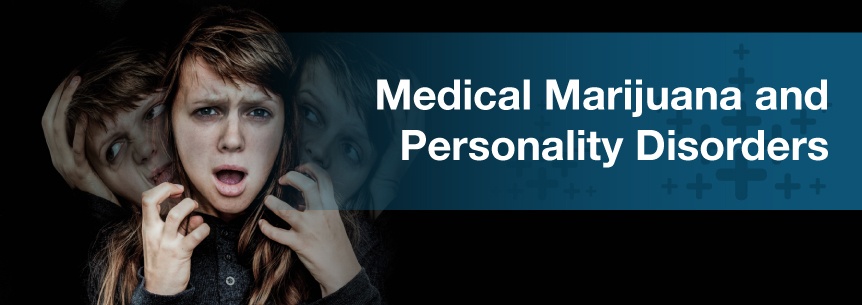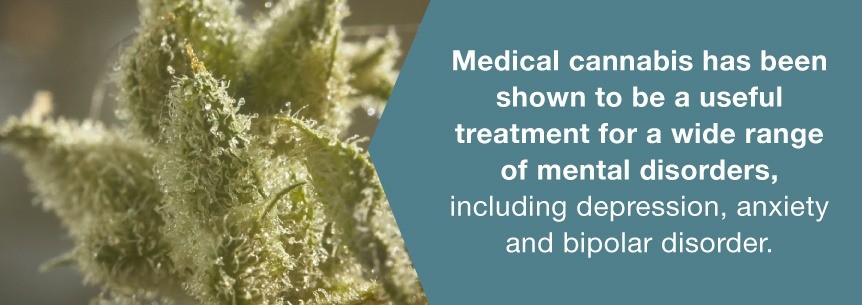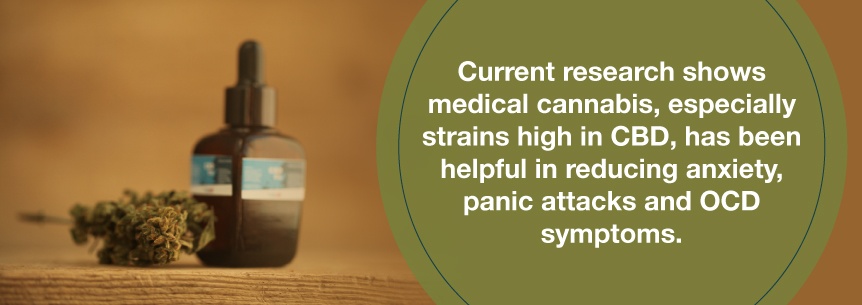
Personality disorders are complex and often misunderstood conditions. While the exact causes of these disorders are still unknown, almost 10 percent of the American population has some variety of personality disorder that affects their lives and relationships.
Medical cannabis can be an effective and natural treatment for personality disorders. But to understand how and why marijuana works for personality disorders, we first need to explore their unique nature.
Medical cannabis for personality disorders provides a natural and effective treatment alternative.
Marijuana works by interacting with the body’s endocannabinoid system. The endocannabinoid system helps maintain homeostasis and balance throughout the body, and it plays a role in regulating your metabolism, immune response, appetite, memory, pain levels and more.
Find A Doctor Find A Dispensary
The chemical compounds in marijuana care called cannabinoids. As you inhale or ingest marijuana, these cannabinoids enter the bloodstream and bind to the endocannabinoid receptors throughout the body. The chemical interaction between marijuana cannabinoids and the endocannabinoid system is responsible for the stereotypical side effects of cannabis use, including relaxation and a “high.”
The endocannabinoid system has two different types of receptors — CB1 receptors in the central nervous system and the brain, and CB2 receptors located in the immune system. Researchers have identified more than 85 distinct cannabinoids in marijuana plants, and each has a slightly different effect, ranging from relaxing your muscles to inducing euphoria.
For example, the two most common cannabinoids are tetrahydrocannabinol (THC) and cannabidiol (CBD). While THC is the chemical responsible for the euphoric “high” associated with cannabis, CBD doesn’t have any similar effects — unlike THC, CBD does not bind to the CB1 receptors in the brain. Marijuana strains that contain more CBD than THC can provide all the health benefits of cannabis without the psychoactive effects.
However, medical marijuana does more than make you feel relaxed. Medical cannabis has been shown to be a useful treatment for a wide range of mental disorders, including depression, anxiety, and bipolar disorder. These conditions often go hand in hand with personality disorders — for example, people with avoidant and dependent disorders often experience anxiety as a primary symptom, and borderline personality disorder often correlates with depression. Medical cannabis can effectively treat these severe and common symptoms of the disorders.

Like other prescribed medications, medical weed targets the symptoms of personality disorders. When looking for specific strains of marijuana to use, take note of the different cannabinoid compositions of each. Indica strains of cannabis are high in THC, while Sativa plants are high in CBD. Typically, you can expect more psychoactive or euphoric effects from Indica strains of cannabis.
People have successfully used medical marijuana to treat aggressive behavior in a variety of mental and developmental disorders, including autism and intermittent explosive disorder. If a personality disorder manifests in aggression, cannabis can be a useful option.
Best Strains: Blue Haze (hybrid), Strawberry Ice (Sativa), Dream Berry (Indica)
Cannabis can help boost the mood and motivation in individuals experiencing depression. Medical marijuana can also help alleviate other common side effects of depression, including loss of appetite, weight loss, fatigue, and insomnia.
Best Strains: Harlequin (hybrid), Pineapple Express (hybrid), Jack Herer (Sativa)
Marijuana can give relief to those experiencing anxiety as a result of their personality disorder. Current research shows medical cannabis, especially strains high in CBD, has been helpful in reducing anxiety, panic attacks, and OCD symptoms.
Best Strains: Granddaddy Purple (hybrid), Northern Lights (Indica), Chocolate Chunk (Indica)

When treating personality disorders, you can apply medical cannabis using a wide range of methods. The most popular ways to use marijuana are smoking and vaporizing. However, many other options are useful, depending on the effect you want to achieve.
Keep in mind each method of application comes with different benefits and disadvantages. For example, while smoking is a fast and effective way to feel the effects of cannabis, it’s difficult to control the dosage. Alternatively, while you can control the exact amount of marijuana in edibles, the results are typically much more potent and long-lasting.
In many cases, it’s possible to treat personality disorders successfully — and medical marijuana can help the healing process.
At Marijuana Doctors, we are committed to giving you the best, most relevant information about medical cannabis and its uses. Begin by exploring the marijuana laws of your state to learn what types of medical cannabis you can use, how much you can have at one time, where to get medical cannabis and more.
The next step is to find a certified marijuana doctor and dispensary you can trust. Browse our directory of trained medical marijuana doctors to find a physician near you, and search our database to find a knowledgeable dispensary. Trained doctors and dispensaries can help you determine the best strains and dosages for your situation.
If you or someone you love has a personality disorder, let us help you find a qualified physician and dispensary — begin improving your life today!
Find A Doctor Find A Dispensary
The idea of human personality is relatively new. Scientists didn’t begin to comprehensively map out personality types until the late 19th century. In the early years of the 20th century, European psychologists created detailed systems of “normal” and “abnormal” personality traits. However, they didn’t consider any observed “abnormal” traits to be legitimate medical conditions.
Until the 1950s, medical opinion commonly held that personality disorders were character weaknesses or intentional behaviors caused by bad parenting. Some therapists treated patients using psychoanalysis, a type of psychotherapy based on Freud’s theories. These patients typically regressed and even got worse after treatment.
When the first Diagnostic and Statistical Manual of Mental Disorders (DSM) came out in the 1950s, it formally recognized personality disorders. However, it still took a few decades for old stigmas surrounding personality disorders to fade from the medical community.
Finally, in 1980, the DSM-3 classified personality disorders as a separate, unique category of disorders. By granting them the same status as other disorders, the medical profession finally considered them legitimate health conditions with profound impacts on the lives of patients and those around them.
Since then, research on personality disorders continues to evolve, with new studies and discoveries each year.
Personality disorders often get confused with other common mental disorders such as depression, schizophrenia, and bipolar disorder. However, personality disorders are in a separate category, with distinct symptoms and effects.
According to the National Institute of Mental Health, around 9.1 percent of the U.S. adult population has some type of personality disorder. The exact diagnosis of a personality disorder is often vague and hard to define because the different disorders tend to blend into one another.

The DSM-5 lists 10 different types of personality disorders, grouped into three “clusters” — cluster A, cluster B, and cluster C. Health professionals will often diagnose patients in one of the three clusters instead of confining them to one specific personality disorder. Personality disorders tend to combine symptoms with others in their cluster, meaning one patient could exhibit behaviors from multiple disorders.
Odd, eccentric behaviors define the three personality disorders in cluster A.
If someone has paranoid personality disorder, they will likely exhibit a deep distrust of anyone other than themselves. That includes their family, friends and romantic partners — people with a paranoid disorder feel unable to trust anyone in their lives, no matter how close. These individuals have a strong sense of personal rights and boundaries, and they tend to withdraw emotionally from others. People with paranoid personality disorder feel shame easily and deeply, and they are typically suspicious, guarded and unforgiving.
People with schizoid personality disorder naturally turn inward, directing most of their attention to their inner life. Commonly, someone with schizoid personality disorder is aloof and detached, tending to spend most of their time in deep introspection. Schizoid disorder leaves people indifferent to others and social conventions, and they often have a minimal range of emotional response.
The primary characteristics of schizotypal personality disorder include atypical patterns of speech, behavior and appearance, with unusual thoughts or perceptions similar to those in schizophrenia. People with schizotypal disorder are often extremely suspicious and tend toward obsessive thought patterns, and they usually have a difficult time establishing and maintaining relationships. While people with schizoid personality disorder avoid social interaction due to a lack of desire or ability, those with schizotypal disorder avoid people out of fear.
The personality disorders of cluster B cause sufferers to display erratic and dramatic behaviors.
Antisocial personality disorder involves having a sweeping unconcern for the feelings or well-being of others. Often, this manifests in a deep disregard for social norms, rules, and obligations. A person with antisocial disorder is typically aggressive, impulsive and incapable of guilt. Antisocial personality disorder is more prevalent in men than in women.
In individuals with borderline personality disorder, the primary characteristic is a lack of any sense of self. This manifests in an intense fear of abandonment, along with feelings of general emptiness in life and relationships. Patterns of emotional instability, unstable relationships, emotional outbursts, and increasingly impulsive behavior are common.
People with histrionic personality disorder typically lack a sense of self-worth. Instead, they rely on the attention and approval of others to feel like they matter. This need to be seen usually manifests in dramatic, loud and even charming behavior. Because their actions and behavior revolve around getting approval, people with histrionic disorder often have a difficult time holding onto meaningful relationships.
Those with narcissistic personality have an extreme sense of self-importance and entitlement. People who have narcissistic disorders are highly envious, and they will deceive, manipulate and exploit others to achieve their desires. This callous treatment of other people stems from a pervasive lack of empathy.

Those with the personality disorders in cluster C exhibit fearful and anxious behaviors.
Feelings of inferiority are the primary characteristic of avoidant personality disorder. Often, people with avoidant personality disorder think they are fundamentally inferior to other people, which makes them withdraw from social situations out of a fear of being rejected, criticized or embarrassed. When in a public or social setting, someone with avoidant personality disorder may appear shy, awkward or anxious.
If someone has dependent personality disorder, they will most likely lack self-confidence and are emotionally overdependent. The primary characteristics of dependent personality disorder include avoidance of responsibilities and helpless, passive behavior. Because they see themselves as inadequate and weak, they feel incapable of acting independently or alone.
Obsessive-compulsive disorder (OCD) is a kind of anxiety disorder that results in unwanted but repetitive thoughts and behaviors. People with OCD tend to be cautious, doubting and controlling, and tend to experience high levels of stress and anxiety. Typically, OCD symptoms manifest in one of four ways — checking, hoarding, contamination or intrusive thoughts.
No one knows for sure the exact causes of personality disorders. Like most mental or psychological conditions, they are the product of both environmental and genetic factors, and they almost always begin in childhood. Medical professionals have observed some common factors in many types of personality disorders, including the following:
For many patients, the perceived root or cause of their disorder will determine what treatment is best for them.
Doctors treat most personality disorders with a combination of therapy and medication.
For personality disorders and other mental conditions, psychotherapy is the primary method of treatment. Psychotherapists encourage their patients to talk through and process their condition, including any emotions, thoughts, moods or behaviors they experience. Different methods of psychotherapy include:
While psychotherapy is helpful for many patients, recent studies have revealed some negative consequences of the treatment. Some patients experience worse, more severe symptoms after psychotherapy. During a therapy session, patients are vulnerable and exposed — in these delicate situations, inexperienced therapists can cause long-term damage by offering poor techniques.
Medications for personality disorders target the significant symptoms of each disorder — prescriptions vary based on an individual’s primary symptoms. Generally, the medications fall into one of three different categories:
In light of these dangerous side effects, some patients are looking for more natural treatment options.